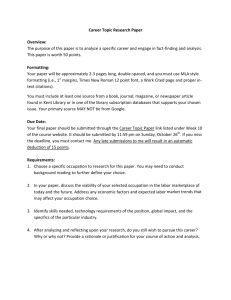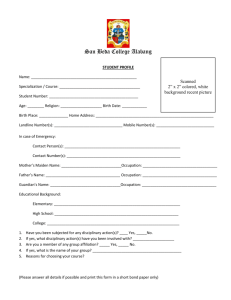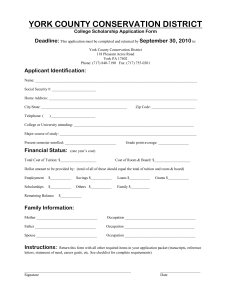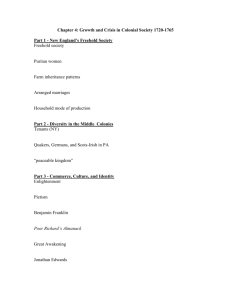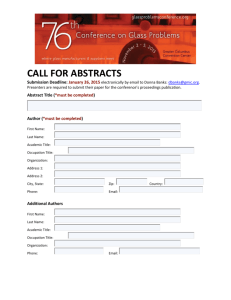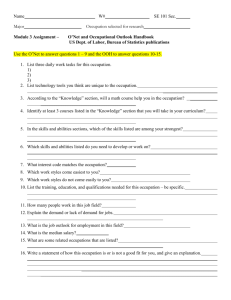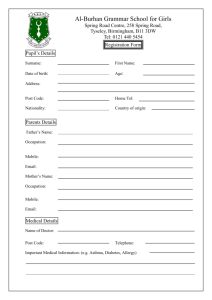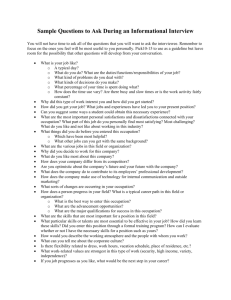Registered Land PowerPoint
advertisement
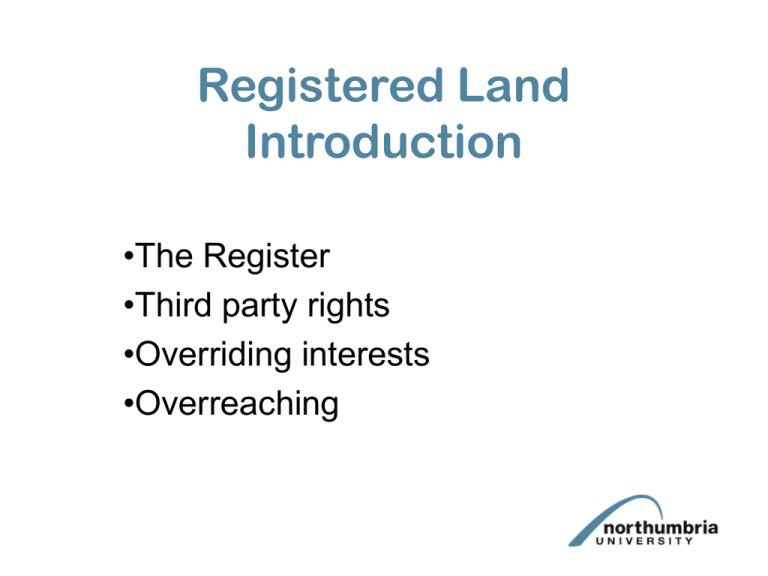
Registered Land Introduction •The Register •Third party rights •Overriding interests •Overreaching Registered Land 1925 Property legislation • In force 1st January 1926: – Law of Property Act 1925 – Land Registration Act 1925 (2002) – Land Charges Act 1925 (1972) Registered Land Land Registration Act 1925 “introduced for the first time …a power in central government to designate areas in which registered conveyancing would be compulsory.” • Compulsory registration. • H.M. Land Registry. • District Land Registries. • www.landreg.gov.uk Registered Land Land Registration Act 2002 • In force 13th October 2003. • Repealed Land Registration Act 1925 • Lays foundations for electronic conveyancing. • Most fundamental reform of property law since 1925. The Register • Not a register of land but ownership of land – Fee simple absolute in possession (freehold) – Term of years absolute (leasehold) • Register divided into 3 parts: – Property register – Proprietorship register – Charges register • Documentation: – Land/Charge certificates – ‘dematerialisation’ of documents – Title Information Document Property Register • • • • • Identifies the land Freehold/leasehold Description (postal address) Reference to plan (title plan) Title number List rights which property benefits from (i.e. easements) Proprietorship Register Identifies the owners of the land • Name and address of current registered proprietors • Grade of title • Details of any restrictions limiting the registered proprietors rights to deal with the land. Proprietorship Register Grades of Title – Freehold Land Absolute Title • Best grade of title • S.26 Land Registration Act 2002 • Subject to: – Entries on the register (i.e. 3rd party rights). – Overriding interests. Proprietorship Register Grades of Title – Freehold Land Possessory Title • Not as good as absolute title • Subject to: – Entries on the register. – Overriding interests. – Adverse pre-registration estates, rights or interests. • Upgrade to Absolute title? – S.62 Land Registration Act 2002. Adverse Possession • Limitation Act 1980: – S.15: Limitation period for recovery of land 12 years. – S.17: at end of 12 year period original owner looses both the right to sue and title to the property. • Land Registration Act 2002: – Apply to be registered as proprietor after 10 years adverse possession. – Registered proprietor notified. – If still in occupation after a further 2 years will be registered as proprietor. Proprietorship Register Grades of Title – Freehold Land Qualified Title • Defect in title • Subject to: – Entries on the register – Overriding interests – Defect noted on the register Proprietorship Register Grades of Title – Leasehold Land Absolute Title • Provide evidence of both freehold and leasehold title • Subject to: – Entries on the register – Overriding interests – Covenants in the lease Proprietorship Register Grades of Title – Leasehold Land Good Title • No evidence of freehold title • Subject to: – Entries on the register – Overriding interests – covenants in the lease Proprietorship Register • • • • Grades of Title – Leasehold Land Possessory Title Same as for freehold land No guarantee of freehold title Can be upgraded to Good Leasehold title after 12 years Qualified Title Same as for freehold land Charges Register Third party rights which affect the land • Rights which burden the land: – Mortgages – Restrictive covenants – Easements Third Party Rights • Enter on Register: – Notice – Restriction – Caution against first registration • Land Registration Act 2002: – Abolition of cautions and inhibitions • Overriding interests Notices • • • • S.32 – 39 Land Registration Act 2002. Agreed notice. Unilateral notice. Leases (exceptions) /easements/restrictive covenants (exceptions)/estate contracts. • Spouse’s right to occupy matrimonial home (Family Law Act 1996). • Interests requiring registration under s.27 Land Registration Act 2002. • Exceptions: s.33 Land Registration Act 2002. Notices • S.33 Land Registration Act 2002: – 5 interests that cannot be protected by the entry of a notice: • • • • Interests under a trust or settlement An interest in any coal or coal mine A lease granted for 3 years or less Restrictive covenants made between a landlord and a tenant • An interest capable of registration under the Commons Registration Act 1965. Restrictions • S.40 – 47 Land registration Act 2002. • Prevent any dealings in the land that are inconsistent with the terms of the restriction. • Example: Prevent registration of land unless specified consents obtained. Priority between Third Party Rights • Date of registration v date of creation? • S.28 Land Registration Act 2002. • Effect of introduction of electronic conveyancing. Overriding Interests • Major exception to principle that purchaser need not be concerned with interests that are not entered on the register. • No requirement to register. • Notice irrelevant. Overriding Interests • Schedules 1 & 3 Land Registration Act 2002. • Schedule 1: Unregistered interests which override first registration. • Schedule 3: Unregistered interests which override registered dispositions. Overriding Interests • • • • Schedule 1 Leases not exceeding 7 years. Interests of persons in actual occupation of the land. Legal easements. Other miscellaneous rights. Overriding Interests Schedule 3 • Lease not exceeding 7 years. • Interests of persons in actual occupation of the land. – Exceptions. • Legal easements. – Exceptions. • Other miscellaneous rights Overriding Interests Interests of persons in actual occupation of the land • Requirements: – Right in the land. – Actual occupation. – None of the Schedule 3 exceptions apply. Overriding Interests Rights • Occupation in itself not enough. • Common right contribution to purchase price but contributor is not registered as a proprietor. • Strand Securities v Caswell [1965] Ch 958 Overriding Interests Actual Occupation • Williams & Glyn’s Bank Ltd v Boland [1981] A.C. 487 – Occupation is a question of fact. – Wife’s occupation is separate to that of her husband. Overriding Interests Actual Occupation • Abbey National Building Society v Cann [1991] A.C. 56 – Degree of permanence and continuity required in order to establish actual occupation. Overriding Interests Actual Occupation • Chokar v Chokar [1984] F.L.R. 313 – Position regarding temporary absence? Overriding Interests Enquiry ‘If the person with the interest was asked before the disposition occurred and s/he failed to disclose their interest when they could reasonably have been expected to do so.’ • London & Cheshire Insurance Co Ltd v Laplagrene Property Co Ltd [1971] Ch 499. • Hodgson v Marks [1971] Ch 892. Overriding Interests Inspection ‘If the persons occupation would not have been obvious on a reasonably careful inspection of the land at the time of the disposition and the person to whom the disposition is made did not have actual knowledge of the interest at the time.’ • New provision in Land Registration Act 2003. • Occupation that must be obvious, not the interest. Overriding Interests Express/implied waiving of right to priority • Paddington Building Society v Mendelsohn (1985) 50 P & CR 244. – Implied consent to mortgage taking priority? Overreaching • Applies to registered and unregistered land • Operates to transfer equitable ownership of land into equitable ownership of money (sale proceeds) – City of London Building Society v Flegg [1988] A.C. 54 – State Bank of India v Sood [1997] 1 All E.R. 169. Overreaching Statutory Criteria • Equitable interest must be capable of being overreached. – Limitation to equitable interests that can be overreached (s.2(3) Law of Property Act 1925). – Excludes equitable mortgages, equitable easements, restrictive covenants and estate contracts. Overreaching Statutory Criteria • Transactions capable of having an overreaching effect (s.2(1) Law of Property Act 1925). Conveyance made by: – – – – Settled Land Act 1925 powers. Trustees of land. Mortgagee or personal representative Under an order of the court. Overreaching Statutory Criteria • Only operates in favour of a purchaser of the legal estate (s.2(1) Law of Property Act 1925). • Includes mortgagees. • Capital monies must be applied appropriately (pay to 2 trustees).
